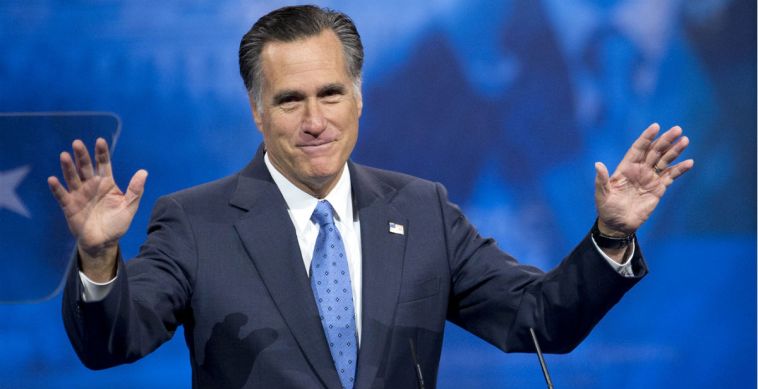This week brought news that the family of journalist Steven Sotloff, who was gruesomely beheaded by the Islamic State, believes that Sotloff was sold to ISIS by the supposedly moderate rebels that were armed by the United States. We also learned that “significant quantities” of American weapons supplied to those moderates are now in the hands of ISIS.
Videos By Rare
Anyone paying attention last year could have predicted that this would happen. There were never any emblazoned lines between the Free Syrian Army and the jihadists stampeding into Syria, and anyone hoping to arm “just” the moderates was on a fool’s errand.
A policy to bolster the Syrian rebels was a policy to bolster ISIS–the most lethal terrorist group we’ve yet seen in the Middle East.
One of the voices calling for such a policy was Mitt Romney.
Seizing on the Syrian civil war as a way to make President Obama look weak during the 2012 campaign, Romney promised “to identify and organize those members of the opposition who share our values and ensure they obtain the arms they need to defeat Assad’s tanks, helicopters, and fighter jets.”
Romney lost that election, but since then his foreign policy fortunes have risen. New polling shows that Obama is perceived as too cautious on international issues. And Romney’s 2012 declaration that Russia is “our number one geopolitical foe,” widely mocked at the time, seems vindicated as Vladimir Putin’s forces steam into Ukraine addled by dreams of lost Soviet glory.
Romney is clearly determined to capitalize on the moment. Last week he published a winding op-ed in the Washington Post damning President Obama for being weak on defense. This week his former foreign policy advisors unveiled something called the “John Hay Initiative,” which isn’t, as its name suggests, a villainous syndicate in a James Bond movie, but rather a non-profit committed to a more militant foreign policy. According to the Daily Beast, “Leaders of the group have briefed multiple potential GOP presidential candidates, top lawmakers, and senior Hill staffers on a regular basis for over a year.”
After months of lurking on the fringes of conservative opinion, Romney has apparently determined that foreign policy is his avenue back into the GOP, with a gaggle of marginalized hawks and neoconservatives clinging to his coattails. They see ISIS, a genuine threat that needs to be destroyed, as something they can leverage against not only Democrats, but also Rand Paul-style realists. Tellingly, Eliot Cohen of the John Hay Initiative is decrying “neo-isolationism” in “both parties.”
Romney and Company are enjoying a boost for one reason: if you consistently take the toughest possible foreign policy stance at every possible opportunity, eventually you’re going to get something right. The Law of Stopped Clocks always applies. But if these thinkers want to be taken seriously, we should look beyond the current rhetoric and examine their records in full.
Romney was wrong about arming the Syrian rebels, as we already established. He supported military action against Moammar Gaddafi, which threw Libya into Islamist-fueled turmoil and opened the door for ethnic cleansing of black Africans. He wanted to attack Iran over a hypothetical scenario in which the Islamic Republic sent Hezbollah to the United States with a dirty bomb—the same Iran that’s now been instrumental in attacking ISIS. And of course, Romney supported the war in Iraq that empowered al Qaeda’s Iraq franchise, which later mutated into ISIS.
The most prominent figure at the John Hay Initiative is Eliot Cohen, a foreign policy advisor to Mitt Romney during the 2012 campaign. Cohen was a member of the Project for a New American Century, which was clamoring for war in Iraq as early as 1998. He renamed the war on terror “World War IV,” which neoconservatives regard as a coinage of tremendous wit and intellect. He attributed criticism of the Iraq war to “anti-Semitism of a type long thought dead in the West.” He supported the Iraq war, called for immediate military strikes on Iran, demanded the overthrow of Gaddafi, and said we should arm the Syrian rebels without congressional approval.
This is the same mechanical aggression masquerading as foreign policy that dominated the Bush administration, and left the GOP stranded in electoral no-man’s-land. The John Hay Initiative, with its chirpy white papers and briefings, is really an effort to undo the foreign policy restraint and prudence that’s developed on the right since the Iraq war.
As the impulse to obliterate ISIS grows and Obama continues to flounder, there will be an inevitable convergence between the GOP’s hawks and realists. Already Rand Paul has come out in favor of war, putting him in the same camp as John McCain and Lindsey Graham.
But the challenges of the present don’t mean we need to resurrect the ghosts of the past. We shouldn’t underestimate ISIS, but we also shouldn’t take seriously those who supported policies that empowered it.

